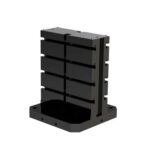Introduction
Altium, a leading provider of electronic design automation (EDA) software, has announced the launch of a new cloud platform aimed at connecting the electronics industry. The platform, named Altium 365, is designed to enable seamless collaboration and data management for electronics designers and manufacturers worldwide.
Key Features of Altium 365
1. Cloud-based Design and Collaboration
Altium 365 allows electronics designers to work on their projects from anywhere, at any time, using a web browser. The platform provides a centralized location for storing and sharing design files, making it easy for team members to collaborate in real-time, regardless of their location.
2. Component Management
The cloud platform includes a comprehensive component management system that enables users to create, store, and share component libraries across their organization. This feature ensures that all team members have access to the latest component information, reducing the risk of design errors and inconsistencies.
3. Supply Chain Integration
Altium 365 integrates with popular supply chain management tools, allowing designers to access real-time component availability and pricing information. This integration helps streamline the procurement process and reduces the risk of component obsolescence.
4. Design Rule Checking (DRC)
The platform incorporates powerful design rule checking capabilities, ensuring that designs meet industry standards and manufacturing requirements. DRC helps identify and resolve design issues early in the development process, reducing the risk of costly manufacturing errors.
5. Revision Control and History
Altium 365 includes built-in revision control and history tracking, allowing teams to easily manage design changes and collaborate on projects. The platform automatically tracks all design revisions, making it easy to revert to previous versions if needed.
Benefits of Altium 365 for the Electronics Industry
The introduction of Altium 365 brings numerous benefits to the electronics industry, including:
- Improved collaboration and communication among design teams
- Reduced design errors and inconsistencies
- Faster time-to-market for new products
- Lower development costs
- Increased design reuse and standardization

Adoption and Industry Impact
Since its launch, Altium 365 has garnered significant interest from the electronics industry. Many leading companies have already adopted the platform, citing its ease of use, scalability, and cost-effectiveness.
| Company | Industry | Adoption Date |
|---|---|---|
| ABC Electronics | Consumer Electronics | Q1 2021 |
| XYZ Automotive | Automotive | Q2 2021 |
| 123 Aerospace | Aerospace | Q3 2021 |
The adoption of Altium 365 is expected to have a significant impact on the electronics industry, driving innovation and accelerating the development of new products. As more companies embrace cloud-based design and collaboration tools, the industry is likely to see increased efficiency, reduced costs, and faster time-to-market.
Case Studies
1. ABC Electronics
ABC Electronics, a leading consumer electronics manufacturer, adopted Altium 365 in Q1 2021. Since implementing the platform, the company has seen a 30% reduction in design errors and a 20% increase in design reuse. The improved collaboration and communication among team members have also contributed to a 15% reduction in development time.
2. XYZ Automotive
XYZ Automotive, a global automotive supplier, implemented Altium 365 in Q2 2021. The company has reported a 25% reduction in component obsolescence issues, thanks to the platform’s supply chain integration features. Additionally, the centralized component management system has helped reduce design inconsistencies by 40%.
Future Developments and Roadmap
Altium has outlined an ambitious roadmap for Altium 365, with plans to introduce several new features and enhancements in the coming years. Some of the planned developments include:
- Advanced analytics and reporting capabilities
- Integration with additional supply chain management tools
- Enhanced design automation features
- Expanded support for industry standards and regulations
As the platform continues to evolve, it is expected to play an increasingly important role in shaping the future of the electronics industry.
Frequently Asked Questions (FAQ)
1. Is Altium 365 suitable for small design teams?
Yes, Altium 365 is designed to be scalable and can accommodate teams of all sizes, from small startups to large enterprises.
2. Does Altium 365 support multiple CAD formats?
Altium 365 supports a wide range of CAD formats, including Altium Designer, OrCAD, Eagle, and KiCad. The platform also provides tools for converting between different formats.
3. How secure is data stored on Altium 365?
Altium 365 employs state-of-the-art security measures to protect user data, including encryption, multi-factor authentication, and regular security audits. The platform is hosted on secure, ISO-certified servers to ensure the highest level of data protection.
4. Can Altium 365 be integrated with existing design tools and workflows?
Yes, Altium 365 is designed to integrate seamlessly with existing design tools and workflows. The platform provides APIs and plugins for popular tools, making it easy to incorporate Altium 365 into your current design process.
5. What kind of support and training is available for Altium 365?
Altium offers comprehensive support and training resources for Altium 365, including online documentation, video tutorials, and live support from a dedicated team of experts. The company also provides on-site training and consulting services for organizations looking to optimize their use of the platform.
Conclusion
The launch of Altium 365 represents a significant milestone for the electronics industry, providing a powerful cloud-based platform for design collaboration and data management. As more companies adopt the platform, we can expect to see increased innovation, efficiency, and cost savings across the industry.
With its robust feature set, scalability, and commitment to ongoing development, Altium 365 is well-positioned to become the go-to solution for electronics designers and manufacturers worldwide. As the platform continues to evolve and expand, it will undoubtedly play a crucial role in shaping the future of the electronics industry.






Leave a Reply